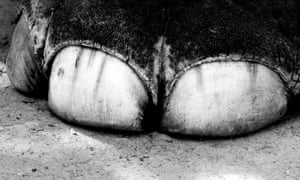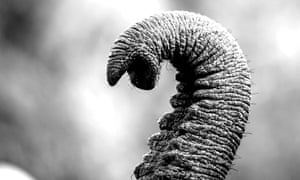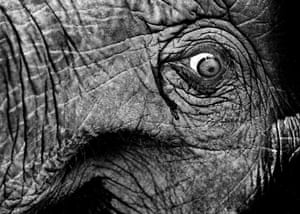If you were an elephant living wild in a western city, you’d be confused and disgusted.
You’d have one two-fingered hand swinging from your face – a hand as sensitive as tumescent genitals, but which could smash a wall or pick a cherry. With that hand you’d explore your best friends’ mouths, just for the sake of friendship. With that hand you’d smell water miles away and the flowers at your feet. You’d sift it all, triaging. Category 1: immediate danger. Category 2: potential threat. Category 3: food and water. Category 4: weather forecasts – short and long range. Category 5: pleasure.
Grumbles from trucks and cabs would shudder through the toxic ground, tickle the lamellar corpuscles in your feet and ricochet up your bones. You’d hear with your feet, and your femurs would be microphones. As you walked 10 miles for your breakfast you’d chatter with your friends in 10 octaves. A nearby human would throb like a bodhran as subsonic waves bounced around her chest.
Even if it swayed with grass instead of being covered in concrete and dog shit, the city would be far, far too small for you. You’d feel the ring roads like a corset. You’d smell succulent fields outside, and be wistful. But you’d make the most of what you had. You’d follow a labyrinth of old roads, relying on the wisdom of long-dead elephants, now passed down to your matriarch. You’d have the happiest kind of political system, run by wise old women, appointed for their knowledge of the world and their judgment, uninterested in hierarchy for hierarchy’s sake, and seeking the greatest good for the greatest number.
No room here for the infantile phallocentric Nietzscheanism that is destroying modern human culture. If you were a boy you’d be on the margins, drifting between family groups (but never allowed to disrupt them) or shacked up with your bachelor pals in the elephant equivalent of an unswept bedsit (though usually your behaviour would be gentler, more convivial and more urbane than cohabiting human males). Your function would be to inseminate, and that’s all. Government would be the business of the females.

‘You’d hear with your feet, and your femurs would be microphones.’ Photograph: Bruno Guerreiro/Getty Images/EyeEm
You’d be a communitarian. Relationality would be everything. It’s not that you couldn’t survive alone, although there would certainly be a survival benefit from being a member of a community, just as humans live longer if they are plugged into a church, a mosque or a bowling club. Yes, at some level your altruism might be reciprocal altruism, where you scratch my back if I scratch yours, or kin selection, where you are somehow persuaded to sacrifice yourself if your death or disadvantage will preserve a gene in a sufficiently closely related gene-bearer. But at a much more obvious and important level you’d be relational – joyously shouldering the duties that come with community – because it made you happy. Why do elephants seek out other elephants? Not primarily for sex, or for an extra arsenal of receptors to pick up the scent of poachers, or because they assume that the others will have found particularly nutritious food, but because they like other elephants.
This should be terribly unsurprising. Yet many humans will be surprised. That shows how fully we’ve fallen for the anthropocentric lie that only humans have minds and real emotions. The lie is the high-water mark of scientific fundamentalism. Fortunately it’s going out of fashion now, but for years it paralysed the study of animal behaviour.
As an elephant, you’d have a mind. You would, no doubt at all, be conscious. All the evidence agrees. None – absolutely none – disagrees. You’d have a sense of yourself as distinct from other things. When you looked out contemptuously at humans, wondering why they ate obviously contaminated food, opted to be miserable and alone, or wasted energy on pointless aggression and anxiety, it would be your contempt, as opposed to generic elephantine contempt, or reflexive contempt that bypassed your cerebral cortex, or the contempt of your sister. It would be you looking out, and you’d know it was you.
‘You’d have a mind. You would, no doubt at all, be conscious.’ Photograph: Palani Mohan/Getty Images
The American ecologist Carl Safina argues that elephant X can understand the relationship that elephant Y has with elephant Z – whether it is a kin relationship or simple friendship. Just think about that. Think about what it entails for X’s knowledge of itself; for X’s ability to think itself into the head of another, and for the way that X must articulate to itself the concept of a third-party relationship. Perhaps elephants are explaining the world to themselves by formulating, evaluating and selecting propositions – a faculty we tend to think of as uniquely ours.
That will be too much for most. Indeed, it’s a mistake to assume that in order to have a mind one has to have a mind that is like human minds. So let’s just say that, according to the evidence, it’s not obviously ridiculous to invite you, the human, to imagine yourself as an elephant. There’s some biological justification for what sounds like a whimsical, sentimental literary device. You and the elephant both have minds, wrought from the same stuff. And your minds engage with the world using the same devices. Your neurological hardware differs only in sensitivity: sodium and potassium surge in the same way through the same molecular gates when you and the elephant step on a nail; the same ancient hormones mediate pleasure, anger and stress. “If you prick us,” ask the elephants (using a chromatic orchestra of sounds, and well over 100 distinct body movements), “do we not bleed?” Indeed they do.
We can be cautiously Beatrix-Pottery with elephants. When the temporal glands near their eyes stream in circumstances that, for us, would be emotional, they’re crying. When a bereaved elephant mother carries her dead baby round on her tusks, or trails miserably behind the herd for weeks, her head hanging down, she’s grieving. When other elephants sit for hours around the body of a dead elephant, they’re mourning. When they cover an elephant corpse with soil or vegetation, or move elephant bones, they’re being reverential. When they cover a dead human, or build a protective wall of sticks around a wounded human, they’re showing an empathic acknowledgment of our shared destiny that we’d do well to learn. These, dear reductionists, are, as you would put it, the most parsimonious hypotheses.
The American ecologist Carl Safina argues that elephant X can understand the relationship that elephant Y has with elephant Z – whether it is a kin relationship or simple friendship. Just think about that. Think about what it entails for X’s knowledge of itself; for X’s ability to think itself into the head of another, and for the way that X must articulate to itself the concept of a third-party relationship. Perhaps elephants are explaining the world to themselves by formulating, evaluating and selecting propositions – a faculty we tend to think of as uniquely ours.
That will be too much for most. Indeed, it’s a mistake to assume that in order to have a mind one has to have a mind that is like human minds. So let’s just say that, according to the evidence, it’s not obviously ridiculous to invite you, the human, to imagine yourself as an elephant. There’s some biological justification for what sounds like a whimsical, sentimental literary device. You and the elephant both have minds, wrought from the same stuff. And your minds engage with the world using the same devices. Your neurological hardware differs only in sensitivity: sodium and potassium surge in the same way through the same molecular gates when you and the elephant step on a nail; the same ancient hormones mediate pleasure, anger and stress. “If you prick us,” ask the elephants (using a chromatic orchestra of sounds, and well over 100 distinct body movements), “do we not bleed?” Indeed they do.
We can be cautiously Beatrix-Pottery with elephants. When the temporal glands near their eyes stream in circumstances that, for us, would be emotional, they’re crying. When a bereaved elephant mother carries her dead baby round on her tusks, or trails miserably behind the herd for weeks, her head hanging down, she’s grieving. When other elephants sit for hours around the body of a dead elephant, they’re mourning. When they cover an elephant corpse with soil or vegetation, or move elephant bones, they’re being reverential. When they cover a dead human, or build a protective wall of sticks around a wounded human, they’re showing an empathic acknowledgment of our shared destiny that we’d do well to learn. These, dear reductionists, are, as you would put it, the most parsimonious hypotheses.

‘You’d smell water miles away and the flowers at your feet.’ Photograph: Simon Eeman/Alamy Stock Photo
If elephants have minds, and minds (as seems likely) can extend beyond the brains in which we conventionally assume they’re situated, we’d expect them to tune into distant elephants, and perhaps into the minds of other species too. There are some tantalising hints that they can. Safina was told by a keeper at a Kenyan elephant sanctuary that the resident elephants knew, from distances well beyond the reach of ordinary senses, that other elephants were on the way – just as Kalahari bushmen know, from 50 miles away, just what a hunting party has killed, and when it will return. When the elephant whisperer Lawrence Anthony died, two groups of elephants that he’d rescued came to his house on two consecutive days. They hadn’t visited for a year.
Perhaps one of the reasons we’re so keen to deny non-human creatures minds, consciousness and personhood is that, if they’re people, they’re embarrassingly better people than we are. They build better communities; they live at peace with themselves and aren’t, unlike us, actively psychopathic towards other species. They know, and take account of, a great deal more information about the natural world than we do.
Back to the shamanic fantasy: you’re a city elephant. You’ll inhabit the city much more intensely and satisfactorily than most of its human denizens. All your senses will be turned fully on. You won’t, like most woefully unsensual humans, use only your eyes, and then translate the visual images into self-referential abstractions with only a slight and dysfunctional relationship to the real world. You’ll be much more properly local than any cockney, New Yorker or Madrileño, though you call Africa your home. You’ll know far more of the city than any geographer, historian, zoologist, botanist, policeman or lover. By trying to become an elephant, you might become a much more thriving human.
Be careful, though. You’re likely to end up dead because someone wants a couple of your teeth.

